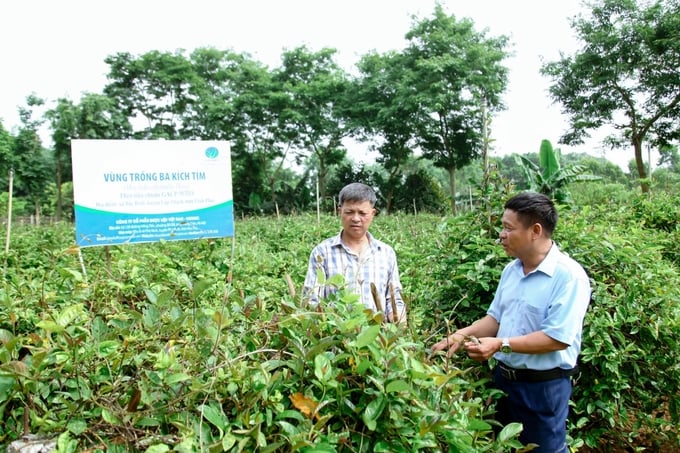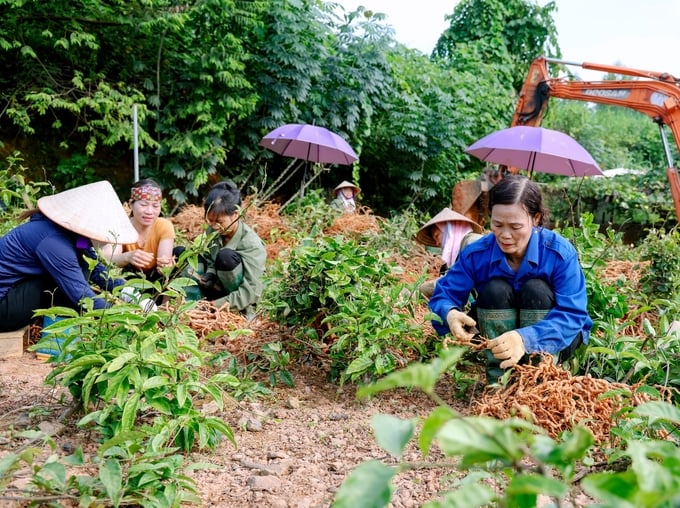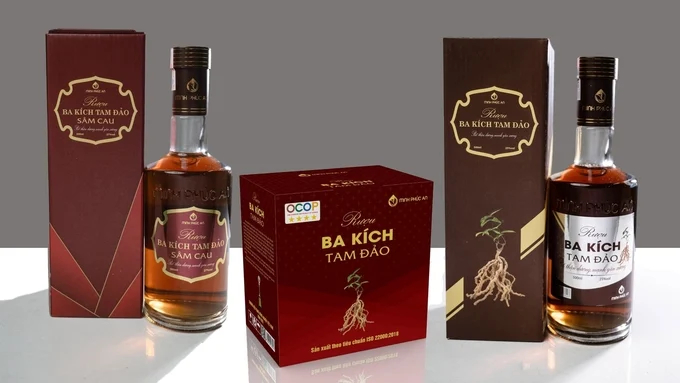May 19, 2025 | 09:33 GMT +7
May 19, 2025 | 09:33 GMT +7
Hotline: 0913.378.918
May 19, 2025 | 09:33 GMT +7
Hotline: 0913.378.918

Mr. Bui Van Sy introduced the medicinal plant Purple Ba Kich at his family's nursery. Photo: Anh Tuan.
In the early 2010s, implementing the policies of the Party and State, especially Lap Thach district, on restructuring crops and livestock, applying scientific and technical advances to production, Mr. Bui Van Sy, Huu Phuc village, Bac Binh commune, Lap Thach district has actively explored and researched plants suitable for the local soil and climate.
In 2014, during a visit to the model of growing purple morinda officinalis on hilly land that brought high economic efficiency, he rekindled his dream of getting this tree variety to grow and make money locally. In 2015, Mr. Sy discussed with his family borrowing money to buy back more than 9ha of barren, ineffective lychee-growing highland to improve the land and experimentally plant 1 hectare of purple morinda officinalis. However, due to a lack of experience, more than 30% of the purple jackdaws died.
Not discouraged, Mr. Sy continued to research documents, watch television programs, and look for long-time morinda officinalis growing households inside and outside the province to learn from experience. After two years of trial planting, the purple morinda officinalis garden began to harvest. In addition to selling seedlings for about VND 100 million, Mr. Sy also sold about VND 500 million of morinda officinalis tubers. Minus expenses, Mr. Sy is sure to earn about VND 200 million in profit.
Determining purple morinda officinalis as an enrichment tree, Mr. Sy expanded the planting area from 1ha to 2ha and covered the remaining 6ha of forest land with green forestry trees. After nearly ten years of planting, he created his brand for the purple morinda officinalis garden. He became the pioneer, bringing this plant variety to enrich many households in Bac Binh commune.

Harvesting purple tripe tubers at Minh Phuc An Company. Photo: Nam Khanh.
From a small purple morinda officinalis production model of Mr. Bui Van Sy, up to now, the entire Bac Binh commune has nearly 50 households growing this medicinal plant with a total area of about 11ha, concentrated in the villages such as Huu Phuc, Bac Son, Yen Thich, etc.
The entire commune supplies the market with 200 tons of morinda officinalis tubers annually. This number is expected to increase in the following years when newly planted areas begin to be harvested in the past 2-3 years. In addition to the main product of morinda officinalis tubers, some households also develop nurseries, providing morinda officinalis seedlings to households inside and outside the province with a total output of 3 million seedlings per year.
Mr. Sy said that the purple morinda officinalis in Bac Binh commune is currently present in many provinces, such as Thai Nguyen, Phu Tho, Yen Bai, Thanh Hoa, Tuyen Quang, etc.
Vietnam Medicinal Materials Joint Stock Company (VIETMEC) currently purchases 100% of the purple morinda officinalis of Mr. Sy's family and households in the Bac Binh commune. As for his family, on average, the garden earns a profit of VND 1.3 - 1.4 billion each year, excluding expenses.
"Compared to forestry crops, growing purple morinda officinalis has higher initial investment costs and requires more land preparation and care. However, the economic efficiency is excellent. Specifically, with the morinda officinalis model of up to 2ha, on average for each crop, my family earns nearly VND 500 million from selling seedlings and VND 800 million from harvesting morinda officinalis tubers, creating regular jobs for six workers main staff and 12 local seasonal workers. The entire area of the family's purple pepper is grown according to VietGAP standards and Collection Practices of medicinal herbs as recommended by the WHO and covered by VIETMEC spending on output," Mr. Sy shared.

Mrs. Phuong at the inspection of purple ba kicha raw materials. Photo: Nam Khanh.
Also passionate about medicinal plants, Mrs. Au Thi Kim Phuong, Director of Minh Phuc An Agriculture Processing Joint Stock Company, Tam Dao district, chose to build a production and processing chain of products from morinda officinalis. The company's chain of links and output of morinda officinalis works well. The linked area increased to dozens of hectares on a scale of 2ha when it was first established.
To gradually increase the value of medicinal plants, the company also invested nearly tens of billions of VND to build a factory and install a production line of healthcare products extracted from morinda officinalis, contributing to creating stable jobs for almost a dozen local workers with stable income.
The company's essential products are all recognized as meeting 4-star OCOP standards. According to Mrs. Phuong, in the coming time, the company will continue to develop and expand markets, conduct marketing, promote critical products, and orient the brand development according to the chain model value association.
Talking about the benefits of participating in the production chain of Minh Phuc An Company, Mr. Nguyen Van Xo, Dong Gieng village, Dao Tru commune, Tam Dao district, said: "About five years ago, consuming products from the morinda officinalis is quite convenient. Wherever you harvest, someone from the company will come to pick it up.
Fresh tripe costs VND 80.000 - 150.000 per kg when purchased at the garden. Minus expenses, each acre (360m2) gives an income of about VND 150 - 180 million per crop lasting five years. With an area of about 2ha, for many years, the morinda officinalis has become a key tree, helping to escape poverty but also helping families have food and wealth."

Wine product of Minh Phuc An Company was recognized as meeting 4-star OCOP standards. Photo: Nam Khanh.
Determining medicinal plants as one of the essential agricultural products, in recent years, Vinh Phuc province has effectively implemented many policies to support the development of critical crops in general and medicinal plants in particular.
Implementing Resolution No. 86/2019/NQ-HDND in 2019 of the Provincial People's Council on Policy Regulations to support the production and consumption of agricultural products, from 2021 to present, the Department of Agriculture and Rural Development has supported 11 programs, including one plan to link the production and consumption of yellow flower tea products.
In 2023, the Vinh Phuc Department of Agriculture and Rural Development coordinated with localities to deploy four organic medicinal plant production models with a 1 ha/model scale, including two organic golden camellia production models in the Tam Quan commune, Tam Dao district and two models of organic morinda officinalis production in Thai Hoa commune and Bac Binh commune, Lap Thach district.
Along with the dynamism of households, the province's policy mechanisms are an essential driving force to help form concentrated organic medicinal herb production areas, with links between production and consumption, contributing to creating jobs and promoting agricultural restructuring for many localities.
Many areas specializing in growing medicinal plants have been formed in the province, concentrated in Tam Dao, Lap Thach districts, and Phuc Yen city, interspersed with seedling nursery models in some households and gardens in traditional medicine at local health stations.
To preserve, exploit, and develop genetic resources of indigenous plant varieties, scarce and endemic species with high economic value, Vinh Phuc province will continue to form new production areas in the coming time.
Focus on exporting goods, promoting the development of medicinal herb cultivation models into a commodity production industry, and at the same time supporting and guiding businesses, cooperatives, and farmers to apply scientific and technical advances in farming, create favorable conditions for units and organizations to conduct scientific research projects on developing data sources.
Translated by Huong Giang

(VAN) 14 out of 35 domesticated elephants in Dak Lak province have had their living conditions improved, with 11 of them currently participating in the non-riding elephant tourism model.

(VAN) Muong Nhe Nature Reserve hopes that being upgraded to a national park will lay the foundation for forest protection efforts to be carried out in a systematic, modern, and sustainable manner.
/2025/05/16/3923-2-171845_52.jpg)
(VAN) Lower costs, higher yields, and improved soil quality are outstanding benefits that soybeans bring when integrated into the crop rotation system.

(VAN) The 'For a Green National Environment' programme aims to promote a green lifestyle, support businesses in implementing ESG practices, and turn Net Zero commitments into concrete actions.

(VAN) Cold-barn systems efficiently manage environmental and temperature conditions, which aids in the prevention of respiratory diseases in pigs and protects them from the vectors that transmit African swine fevers.

(VAN) To tackle challenges, the project 'Addressing key technical bottlenecks in the grouper supply chain in Vietnam' has been underway since 2024.

(VAN) The project 'Disease-Resilient and Sustainable Cassava Production Systems in the Mekong Region', funded by the Australian Center for International Agricultural Research (ACIAR), is being implemented from 2024 to 2028.